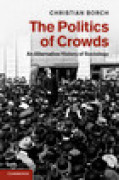
This book analyses sociological discussions on crowds and masses since the late nineteenth century, covering France, Germany and the USA. Modern society was born as a society of crowds. This book analyses how the phenomenon of crowds became a concern to sociologists in the nineteenth century and how the understanding of crowds has evolved since then. The result is a fresh perspective on society and modern sociology. Modern society was born as a society of crowds. This book analyses how the phenomenon of crowds became a concern to sociologists in the nineteenth century and how the understanding of crowds has evolved since then. The result is a fresh perspective on society and modern sociology. When sociology emerged as a discipline in the late nineteenth century, the problem of crowds constituted one of its key concerns. It was argued that crowds shook the foundations of society and led individuals into all sorts of irrational behaviour. Yet crowds were not just something to be fought in the street, they also formed a battleground over how sociology should be demarcated from related disciplines, most notably psychology. In The Politics of Crowds, Christian Borch traces sociological debates on crowds and masses from the birth of sociology until today, with a particular focus on the developments in France, Germany and the USA. The book is a refreshing alternative history of sociology and modern society, observed through society's other, the crowd. Borch shows that the problem of crowds is not just of historical interest: even today the politics of sociology is intertwined with the politics of crowds. INDICE: Introduction: the crowd problem; 1. Setting the stage: crowds and modern French society; 2. Disciplinary struggles: the crowd in early French sociology; 3. Weimar developments: toward a distinctively sociological theory ofcrowds; 4. Liberal attitudes: crowd semantics in the USA; 5. From crowd to mass: problematising the classless society; 6. Reactions to totalitarianism: newfusions of sociological and psychological thinking; 7. The culmination and dissolution of crowd semantics; 8. Postmodern conditions: the rise of the post-political masses; Conclusion: the politics of crowds.
- ISBN: 978-1-107-00973-8
- Editorial: Cambridge University
- Encuadernacion: Cartoné
- Páginas: 346
- Fecha Publicación: 12/04/2012
- Nº Volúmenes: 1
- Idioma: Inglés
